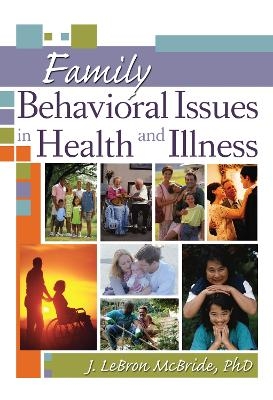
Family Behavioral Issues in Health and Illness
Routledge (Verlag)
978-0-7890-2943-0 (ISBN)
A closer look at your patient’s family situation can help you develop a more effective treatment plan
Family Behavioral Issues in Health and Illness is a basic but thorough introduction to the impact family dynamics can have on a person’s health. Ideal as a supplemental training text for healthcare professionals, this unique book examines the connections between family and health, presenting a concise summary of family systems theory, basic family assessment, and the family life cycle. The book provides an understanding of how the patterns and systems found in a diverse range of family styles can create special health issues, and how the ability to assess and anticipate those issues can ensure the most comprehensive patient care and cost-effective management of time and resources.
As long as families continue to be the primary environment where patients learn and develop their beliefs and overall attitudes about life, it remains essential that any primary healthcare model includes a strong background in family dynamics and the critical, pivotal points of family life. Family Behavioral Issues in Health and Illness addresses the most important aspects of family to consider when providing care, presenting practical, real-life case studies that examine the resilience, strengths, and possibilities of families, as well as the problems and dysfunctions. The book looks at how significant events, such as marriage, divorce, birth, and death affect families, and how a knowledge of special family issues, including parenting, abuse, disability, and chronic illness prepares the healthcare professional to provide effective care for traditional, single-parent, multiracial, blended, adoptive, and same-gender families.
Family Behavioral Issues in Health and Illness examines:
boundaries, roles, and rules
triangulation
subsystems
scapegoating
parentification
healthy families
the family genogram
spiritual crises of family members
infertility
families without children
intergenerational families
the family in later life
coping with alcoholism, dementia, bereavement, and/or mental illness
and much more
Family Behavioral Issues in Health and Illness is an essential reference for healthcare professionals, educators, parents, and family members. The book provides a practical understanding of family relationships that helps healthcare providers guide patients toward a more complete well-being.
J Lebron Mcbride
Foreword (Wayne S. Dysinger and June N. Dysinger)
Preface
Acknowledgments
Chapter 1. The Changing American Family
Definition
Family Systems Theory
The Family and Its Influence on Health
Basic Family Assessment
The Family Genogram
Chapter 2. The Family Life Cycle
The Single Young adult
The New Couple
The Family with Young Children
The Family with Adolescents
Launching Children and Moving On
The Family in Later Life
Chapter 3. Variations to the Family Life Cycle
Blended Families
Single-Parent Families
Gay and Lesbian Families
Families with Infertility
Adoptive Families
Families Without Children
Families from Other Cultures
Intergenerational Families
Multiracial/Multiethnic Families
Chapter 4. Special Family Topics
Divorce
Abuse
Medical Issues and Family Life
Chronic Medical Illness or Disability
Dementia
Bereavement
Mental Illness
Alcoholism
Healthy Families
Conclusion
Resources
References
Index
| Erscheint lt. Verlag | 3.5.2006 |
|---|---|
| Verlagsort | New York |
| Sprache | englisch |
| Maße | 148 x 210 mm |
| Gewicht | 294 g |
| Themenwelt | Studium ► 1. Studienabschnitt (Vorklinik) ► Histologie / Embryologie |
| ISBN-10 | 0-7890-2943-X / 078902943X |
| ISBN-13 | 978-0-7890-2943-0 / 9780789029430 |
| Zustand | Neuware |
| Haben Sie eine Frage zum Produkt? |
aus dem Bereich


